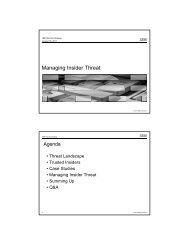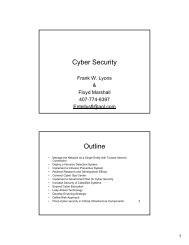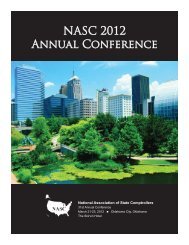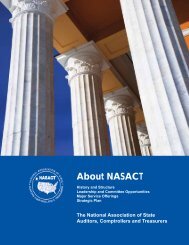Advisory Committee on Tax Exempt and Government Entities (ACT ...
Advisory Committee on Tax Exempt and Government Entities (ACT ...
Advisory Committee on Tax Exempt and Government Entities (ACT ...
You also want an ePaper? Increase the reach of your titles
YUMPU automatically turns print PDFs into web optimized ePapers that Google loves.
The Appropriate Role Of The Internal Revenue Service With Respect To <strong>Tax</strong>-<strong>Exempt</strong> Organizati<strong>on</strong> Good Governance Issuesjurisdicti<strong>on</strong>. Charitable governance issues arise from secti<strong>on</strong> 501(c)(3)’s operati<strong>on</strong>altest <strong>and</strong> inurement proscripti<strong>on</strong>; 24 secti<strong>on</strong> 4958’s impositi<strong>on</strong> of excise taxes <strong>on</strong> excessbenefit transacti<strong>on</strong>s between public charities 25 <strong>and</strong> those in a positi<strong>on</strong> to exercisesubstantial influence over them (particularly the procedures set forth in the regulati<strong>on</strong>sto secti<strong>on</strong> 4958 regarding how to obtain the rebuttable presumpti<strong>on</strong> ofreas<strong>on</strong>ableness); 26 the limits <strong>on</strong> transacti<strong>on</strong>s involving private foundati<strong>on</strong>s <strong>and</strong> theirinsiders, including directors, trustees, their family members, <strong>and</strong> other related parties; 27<strong>and</strong> the statutorily m<strong>and</strong>ated public disclosure of the Forms 1023 <strong>and</strong> 990. 28Governance is an issue in each of the IRS’s five points of c<strong>on</strong>tact with the tax-exemptsector: in creating st<strong>and</strong>ards for exempti<strong>on</strong>; <strong>on</strong> determinati<strong>on</strong> of exempti<strong>on</strong>; <strong>on</strong>examinati<strong>on</strong> or in other compliance initiatives; in 990 reporting; <strong>and</strong> in educati<strong>on</strong> <strong>and</strong>outreach.The IRS’s view that “a well-governed charity is more likely to obey the tax laws,safeguard charitable assets, <strong>and</strong> serve charitable interests than <strong>on</strong>e with poor or laxgovernance” 29 seems self-evident. At the same time, efforts to promote goodgovernance are fraught with complexity. There are over 1.2 milli<strong>on</strong> organizati<strong>on</strong>sdescribed in secti<strong>on</strong> 501(c)(3) today. 30 Effective governance practices am<strong>on</strong>g theseorganizati<strong>on</strong>s will vary depending <strong>on</strong> numerous factors, including size, sophisticati<strong>on</strong>,locati<strong>on</strong>, available resources, <strong>and</strong> activities. 31 Moreover, while we may all agree thatgovernance matters, it is not at all clear that requiring specific governance practicesresults in greater compliance with the tax laws. In fact, superior board governance mayhave much more to do with the values, active engagement, <strong>and</strong> accountability of thosein charge than with the adopti<strong>on</strong> of procedures <strong>and</strong> policies. Yet, the IRS merely askingabout specific governance practices is a powerful force that can drive behavior.Charities can feel pressured to adopt the specified practices even where it isinadvisable in their situati<strong>on</strong> because they believe the IRS or others will c<strong>on</strong>sider thempoorly governed if they fail to do so. This can effectively usurp the judgment of thegoverning board in determining what governance practices make sense in its specificc<strong>on</strong>text, place undue burdens <strong>on</strong> organizati<strong>on</strong>s, divert their attenti<strong>on</strong> to proxies forgovernance instead of actual governance, <strong>and</strong> adversely impact the unique, diverse,24All references to “secti<strong>on</strong>” are to the IRC unless otherwise indicated. Inurement also is proscribed by IRC secti<strong>on</strong>s 501(c)(4),501(c)(5), 501(c)(6), 501(c)(7), 501(c)(9), <strong>and</strong> 501(c)(10), inter alia.25IRC secti<strong>on</strong> 4958 also regulates excess benefit transacti<strong>on</strong>s involving IRC secti<strong>on</strong> 501(c)(4) organizati<strong>on</strong>s.26Treas. Reg. § 53.4958-6.27See IRC secti<strong>on</strong>s 4946 (defining disqualified pers<strong>on</strong>s to private foundati<strong>on</strong>s), 4941 (self-dealing), <strong>and</strong> 4945 (taxableexpenditures).28See discussi<strong>on</strong> infra at notes 104-06 <strong>and</strong> accompanying text.29Preface to Governance <strong>and</strong> Related Topics – 501(c)(3) Organizati<strong>on</strong>s, supra note 22.30See Remarks of Steven T. Miller, Commissi<strong>on</strong>er, TE/GE, IRS, Georgetown <strong>Tax</strong> C<strong>on</strong>ference (April 24, 2008),http://www.irs.gov/pub/irs-tege/represent_manage_speech_042408.pdf.31See Panel Principles, supra note 13, at 5: “[G]iven the wide, necessary diversity of organizati<strong>on</strong>s, missi<strong>on</strong>s, <strong>and</strong> forms of activitythat make up the n<strong>on</strong>profit community, it would be unwise, <strong>and</strong> in many cases impossible, to create a set of universal st<strong>and</strong>ards tobe applied uniformly to every member. Instead, the Panel commends the following set of principles to every charitable organizati<strong>on</strong>as guideposts for adopting specific practices that best fit its particular size <strong>and</strong> charitable purpose”ADVISORY COMMITTEE ON TAX EXEMPT AND GOVERNMENT ENTITIES (<strong>ACT</strong>) June 11, 2008 11













